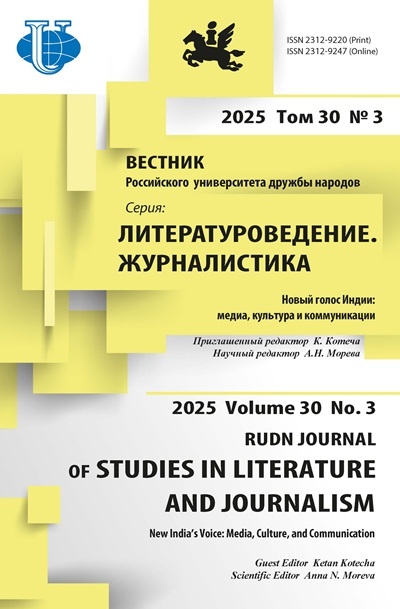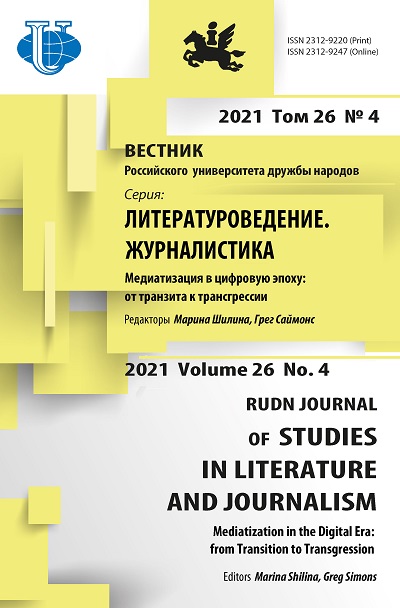Трансдискурсивность как концепт цифровых миров
- Авторы: Костикова А.А.1, Спартак С.А.1
-
Учреждения:
- Московский государственный университет имени М.В. Ломоносова
- Выпуск: Том 26, № 4 (2021): МЕДИАТИЗАЦИЯ В ЦИФРОВУЮ ЭПОХУ: ОТ ТРАНЗИТА К ТРАНСГРЕССИИ
- Страницы: 649-655
- Раздел: Журналистика
- URL: https://journals.rudn.ru/literary-criticism/article/view/29855
- DOI: https://doi.org/10.22363/2312-9220-2021-26-4-649-655
- ID: 29855
Цитировать
Полный текст
Аннотация
В статье представлен анализ трансформаций медиакультуры в условиях радикальной цифровизации общества. Повседневность принципиально медиатизируется и этот процесс оказывается вне управления и осмысления как отдельным человеком, так и профессиональным сообществом и обществом в целом. Мы наблюдаем скорее общее тревожное ощущение нарушения привычных границ определений и норм. В ответ на ситуацию кризиса в понимании и оценке этих процессов философия языка и коммуникации возвращается к идее дискурсивности человеческой цивилизации и предлагает адаптировать и переосмыслить концепцию возможных миров и их описаний - прежде всего для решения задачи обновления социальных стратегий и коммуникации. Возрастающий спрос на методологическое обеспечение коммуникативной деятельности свидетельствует о растущем значении «кабинетной» философии, в частности философии языка и коммуникации. Такая стратегия научного подхода позволит выстроить исследование релевантно предмету - трансдисциплинарно. На основе анализа истории идей и современной российской методологии трансдисциплинарности авторы выдвинули гипотезу в терминах философии языка о развитии цифрового медиатизированного дискурса в трансмерное единство, генерирующее различные дискурсы.
Об авторах
Анна Анатольевна Костикова
Московский государственный университет имени М.В. Ломоносова
Автор, ответственный за переписку.
Email: akostikova04@ya.ru
ORCID iD: 0000-0002-5471-5306
кандидат философских наук, доцент, заведующая кафедрой философии языка и коммуникации философского факультета
Российская Федерация, 119234, Москва, Ленинские Горы, 1Сергей Андреевич Спартак
Московский государственный университет имени М.В. Ломоносова
Email: sspartak@ya.ru
ORCID iD: 0000-0002-8862-703X
кандидат политических наук, старший преподаватель философского факультета
Российская Федерация, 119234, Москва, Ленинские Горы, 1Список литературы
- Kostikova, A., Segal, A., Sorina, G., & Spartak, S. (2017). Big Data: a loop or a challenge for human morality: mapping Russian tradition in philosophy and methodology. Russian Journal of Communication, 9(3), 252-262.
- Kostikova, A. (2018). French theory and language criticisms. International Multi-disciplinary Scientific Conferences on Social Sciences and Arts SGEM, 5(4.1), 373-378.
- Shilina, M.G. (2018). Innovation Driven Strategic Communication: Towards a Holistic Approach Public administration. Electronic bulletin, (66), 44-59.
- Deleuze, G. (1988). Spinoza: Practical Philosophy (p. 127). Transl. R. Hurley. San Francisco.
- Derrida, J. (1976). Of Grammotology. Transl G. Spivak. Baltimore and London.
- Lacan, J. (1977). Ecrits. A Selection. Transl. A. Sheridan. London.
- Foucault, M. (1972). The Archeology of Knowledge and the Discourse on the Language. Transl. A. Sheridan, NY.
- Аршинов В.И., Горохов В.Г., Буданов В.Г. и др. Проблема междисциплинарности в контексте реформ российской науки. Материалы «круглого стола» // Философия науки и техники. 2016. Т. 21. № 1. С. 5-35.
- Сорина Г.В. В.А. Бажанов. Мозг - Культура - Социум. Кантианская программа в когнитивных исследованиях // Вопросы философии. 2020. № 2. С. 211-213.
- Simondon, G. (2012). Du mode d’existence des objets techniques. Paris, Aubier, 1958; dernière réédition corrigée et augmentée. Paris: Flammarion.
- Kostikova, А.А. (2013). Postmodernism: A feminist critique. Metaphilosophy, 44(1-2), 24-28.
- Merleau-Ponty, M. (1945). Phenomenologie de la perception (p. 9). Paris.
Дополнительные файлы















